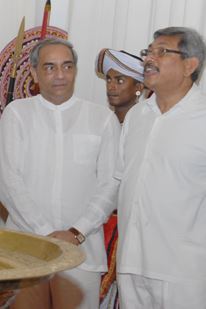No Mercy For Shanty Dwellers Challenging UDA From De Facto CJ
Making policy statements from the Bench in open court in support of the Gotabaya Rajapaksa led Urban Development Authority, Sri Lanka’s de facto Chief Justice yesterday said no one should obstruct ongoing development programmes in Colombo, and denounced shanties and low income neighbourhoods as breeding grounds for vice.
Chief Justice Mohan Pieris said it was the responsibility of all stakeholders is to extend their support for the Governments programme to create a better living standard for low income earners in the city of Colombo, state media broadcaster Rupavahini said yesterday.
Pieris made these comments in open court when a petition filed against UDA with regard to the removal of several shanties in the slave island area was taken up for hearing at Supreme Court yesterday, according to the Rupavahini report.
“State Counsel told court measures would be taken to provide new houses to families who were evacuated from the area,” the State broadcaster said.
It said that Mohan Pieris had praised the initiative and said that low income earners in the city of Colombo resort to various vices because they have no proper housing facilities. Illegal acts such as narcotic rackets are evident in this environment, he said. Pieris pointed out that such activities could be prevented by providing facilities to these people to lead a better lifestyle, Rupavahini said in its nightly news broadcast.
Pieris added that everyone should refrain from obstructing the relevant programme.
Mohan Pieris was formerly an advisor to the Ministry of Defence and also served on two Defence Ministry owned and operated companies, Lanka Logistics and Rakna Lanka. The Chief Justice who was appointed following the flawed impeachment of Chief Justice Shirani Bandaranayake is believed to have been the choice of the Secretary to the Ministry of Defence Gotabaya Rajapaksa.
Since assuming office in January Pieris has made several highly political and partisan statements from the bench in open court, making it plain that victims of state excesses with regard to land acquisition, eviction and even death in state custody would not be eligible for redress under Pieris’ reign.
New Education Policies And Proposals – A Review
By Sujata Gamage -October 1, 2013
 A document outlining New Education Policies and Proposals (NEPP) was presented recently to the speaker and the members of the parliament by the Ministry for Education. This document is a result of deliberations on a new education act that began with a public notice published in November 2007 by the Committee to Draft a New education Act seeking input, and culminated with a series of sittings by a Select Committee of Parliament held during 2012.
A document outlining New Education Policies and Proposals (NEPP) was presented recently to the speaker and the members of the parliament by the Ministry for Education. This document is a result of deliberations on a new education act that began with a public notice published in November 2007 by the Committee to Draft a New education Act seeking input, and culminated with a series of sittings by a Select Committee of Parliament held during 2012.
The NEPP document would not have seen the light of day if not for the efforts by a group of volunteers who worked with Dr. Dr. G.B. Gunawardena, the Chairman of the Committee to Draft a New Act, to complete the document. The Gunawardena committee ran out of money midway and the work of the committee ground to a halt. Volunteers led by Upali Chandrasiri, a civil society activist, worked day and night with Dr. Gunawardena, even spending money out of pocket, to complete the document.
The first and last comprehensive piece of legislation on education in Sri Lanka was enacted as far back as 1939. Since then several acts were passed for specific purposes such the take-over of schools (1960 and 61), Public Examinations (1968), Pirivena Education (1979), National Institute of Education (1981), Colleges of Education (1986), National Education Commission (1991) and School Development Boards (1993). To date, the education system has essentially been governed by these Acts and a system of circulars. It is opportune that the government has taken the initiative to update provisions of those acts and consolidate miscellaneous circulars.


